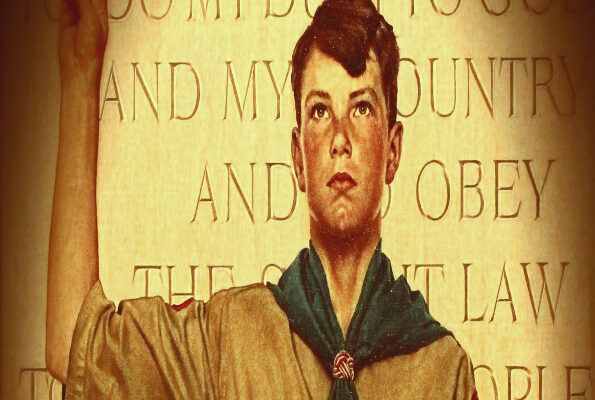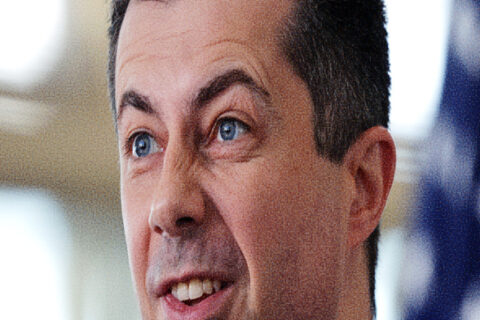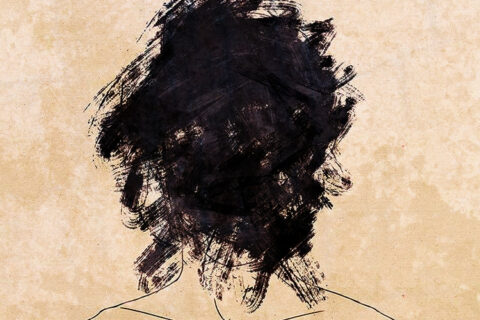Summer 2011. Midway through the week our troop had made it to the championship canoe race between our camp (west) and east camp. We’d beaten out everyone else on our side of the lake to face an unknown opponent for the title of “Canoe Race Champion.” We got our asses kicked. A week of rowing amounted to a furious effort against a team of high schoolers (I was a rising 7th grader and one of the oldest guys in our troop on this campout).
Fast-forward to Summer 2017. I have just finished hiking to the top of Mount Baldy at Philmont, New Mexico. I was on top of the world both literally and metaphorically. I had done so with my actual brother and several men who I also felt a fraternal bond to. It would end up becoming the subject of my college application essay. I reflected on my youth, remembering that I had certainly lost at a lot of things, but I was a winner on that day and many other days.
On May 7th, the Boy Scouts of America officially changed their name from Scouting BSA to Scouting America. This comes seven years after the Scouts announced they were going to allow girls and troons to join, nine years since they decided to allow homosexuals to take leadership roles, and eleven years after the National Council voted to allow homosexual youths (lol) to join. The comment sections were unsurprisingly replete with former Eagle Scouts duking it out with Norwood 5A’s jannies. I wasn’t surprised: the name change was akin to seeing your ghoulish troon cousin four months into HRT at a family gathering after having initially heard the news. But it did cement that there just are no more spaces in American society, or the West writ large, for young men.
Many of you are probably aware of the idea of a mannerbund or Koryos, a roaming warrior band of Indo-European youths. Historians suspect they were responsible (or had a major role) for the conquest of Europe by Indo-European tribes. The concept survived throughout history: both in the military context as societies saw the benefit in their young men and warrior-class forming tight-knit, fraternal bonds as well as in our social and educational context. The fraternity is a great example and was a staple of American elite culture. College used to not be a credentialing mill, believe it or not: it was finishing school for our patricians who would hone their skills in rhetoric, culture, art, science, but most importantly would form a mannerbund with their colleagues at great institutions. Looking at the history of many fraternities you see memberships filled with some of the best and brightest we have had to offer. Astronauts, statesmen, scientists, great military leaders, they may have been gifted with great heritage and the fortune of being born in a far better time but they became men as they served in their various fraternal orgs.
Scouting was a unique development that sprung from the genius of Lord Robert Baden-Powell. He was inspired not only by his experiences policing British South Africa and Matabeleland, but also upon hearing stories of the great American frontiersmen and Natives. Men who forged a nation from a wild, untamed land along with a people who had an almost supernatural connection to the land. The American legend personified. In an age of rapid industrialization where people, especially young men, were becoming divorced from the land this presented as an opportunity to Lord Baden-Powell. Upon his return, he hosted a campout at Brownsea Island – a name still legendary in American scouting – and drew volunteers from the Boys’ Brigade (a similar organization at the time). Lord Baden-Powell knew that warfare was becoming less a game of the aristocracy and more of a meritocratic endeavor, however the pools from which society was drawing their officers were becoming less tied to the land. How many men would go without ever holding a rifle until they received a draft notice? How many would never learn the basics of tracking wild game? In creating the idea of scouting he sought to not only teach young men civic virtue but important martial doctrine like patrolling, tracking, and strategy. Beyond that, he sought to create men of chivalry and valor in what was becoming an increasingly debased society. The first edition of Scouting for Boys looks at the need for scouting and the need for a body of able young men from which Britannia could draw upon. It became popular in the States for a similar reason, as cities exploded and families looked to find a means for their young men to connect with the land, and overtook British scouting because it was inherently closer to the frontier and many great wild spaces. Scouting itself became a great fixture but especially for our military: I have heard from mixed sources that holding the rank of Eagle Scout essentially guaranteed a quick promotion after enlisting, and older editions of the Scouting handbook was essentially a guide on patrolling.
Scouting is dead now. It’s been dead for some time, but it seems that they’ve finished skinning and tanning its hide for some grotesque imitation to wear. Where else are our young men to go? Fraternity life has become hollow and essentially an MLM. It will still teach you, or any other similarly situated young men, about some important life lessons. I am sure there are some good chapters out there, but my experience was nationals focusing purely on increasing membership as much as possible without a regard for quality of character (although, I had a heck of a great time with the guys who I can call brother). I’d quote Bowling Alone but I think you get the idea.
The irony is that the Catholic Church and Scouting suffered similar issues in that they had to deal with sexual abuse scandals at similar times. Atomization and our steep decline can be blamed for membership declines in both organizations. Both took steep hits to membership and involvement. However, the Church in America has evolved and has begun to return to its more traditional roots. This has seen a huge boost in attendance and the decline of der boomer liberalism as a guiding doctrine for the Church. New priests are almost exclusively ultra-orthodox and socially conservative. I had the opportunity to attend SEEK in 2019 and I saw that the Catholic youth of the day were focused partially on retvrning, but also on the idea of this Church being in this world but not of it. There’s a recent article that discusses this on AP called A Step Back in Time. A good read when it comes to the values shift and re-alignment taking place.
Scouting, on the other hand, is going to learn that there are consequences for drifting too far from one’s core identity. The organization lost roughly half of its membership due to “Covid.” People, especially young men, crave authenticity and scouting seems to be trying to have its cake and eat it, too. The numbers since 2019 are also down despite broadening membership. I perused the list of merit badges and it seems that they’ve only added two nu-badges (sustainability and American Cultures), but they have watered down some of the other badges. Rifle shooting can be completed with a pellet gun now. The current chief scout executive is some beltway ghoul who, in an interview about this decision, seemed to cynically understand that this was being done purely to lower barriers to entry. But he also understands that membership is evaporating away into nothing.
BAP talks a lot in Bronze Age Mindset about how there just simply is not a space for young men to grow and develop their skills and capabilities. You can read this portion specifically in part two on the parable of the iron prison. Men need space in which they can develop their skills and build confidence. They need to be able to do this alongside men of a similar stripe. I was thinking about how fortunate I was to get this opportunity as a youth, as did my brother and cousins, but I am reminded of how tragic a loss this genuinely is. After “Scouting America” goes belly up, who will acquire Philmont? I had the opportunity to traverse it and I will legitimately become homicidal if I hear it’s been acquired by some goober. Florida Sea Base? All of the great camps and locales that can be found dotted throughout the United States. I am the man I am today because I had the opportunity to be brave and challenge myself but what will the men of tomorrow be like? Can we ever fill this niche?
People are becoming more insulated from life in general: you could go through all of high school and never experience any great personal victories or defeats and live an existence totally separate from any risks. I hope we can because I would want my posterity to ultimately have the same experience. I hope we do take the opportunity to fill the niche given a lot of young men seem to be aching for an opportunity to do something.
-By Teodorico

Visit The American Sun at The American Sun






Interesting article. The subject matter is right in line with similar observations made by Henry Ford that I’m reading at present:
“There was a time in American history, and it was the most glorious period of our past, when opposition was considered an often-desirable attitude. A man’s weight was accounted equal, whether computed by the number of his enemies or his friends. But a softening change has come over us. We have grown to like applause. Hisses used to stir our fathers; hisses cow their sons. Public speech has thus grown flabby; the Press has thus become neutral; we have grown pudgy and futile in our program of “helping the weak,” so pudgy and futile that we no longer have gristle to attack the strong who have brought weakness upon the others. As a people, we have passed the “bunk” around so habitually; we have enervated our judgement and moral convictions so seriously by our fake “philosophy of Boost,” we have become so accustomed to measure the effectiveness of work by the applause it immediately provokes, that we have lost all stomach for courses that call for contest, unless it be those spurious contests of the political arena, which are all managed from the same Great Headquarters.” p. 173.
Henry Ford, ‘The International Jew’, Book 1
Look at what happened to beautiful Camp Geronimo in Arizona for a preview of what awaits Philmont and many others. It’s an utter disgrace. My boy Eagled out in 2019 and I believe he was among the last of the real Scout era. A tremendous loss.
Look at what happened to beautiful Camp Geronimo in Arizona for a preview of what awaits Philmont and many others. It’s an utter disgrace. My boy Eagled out in 2019 and I believe he was among the last of the real Scout era. A tremendous loss.
Hello German Confederate.
Great comment from a great man. Henry Ford and others took the ‘peace ship’ to Europe in WW1 to try and stop the war that he blamed on bankers and stock traders, similar to what Rudolph Hess tried to do in WW2. There is a book called ‘revolt on the Clyde’ by William Gallacher, 1936, that recalls how he and the communist formed a union during WW1 and took over the labor of the munition factories in England, the union boss gets elected to parliament and the book ends with him gushing on Stalin in that chamber right before WW2.
Henry Ford suffered a similar fate with his factory getting taken over by a communist labor union.
It’s no surprise they dismantled the boy scouts of America, one of the last healthy institutions left in the US.
I wanted to bring that book to your attention, God Bless you Sir and all here at ID.
Thanks for the recommendation, sir! It sounds like you’re ahead of me regarding Henry Ford. I’m only just now working my way through Book 1 of ‘The International Jew’. I had always thought it was sort of a peripheral work, rather than a foundational work of anti-Gentilism! How wrong I was. I had just finished Theodor Fritsch’s ‘The Riddle of the Jew’s Success’ and that led me to Henry Ford. Thanks again!
Thank you German Confederate, I was in a hurry for work and am ashamed of my sentence structure on that comment that I left you.
…that recalls how he (being Gallecher) and the communist formed a union…….
I should have started a new paragraph.
Ken Burns of PBS fame did a great documentary on Henry Ford believe it or not. I recommend that one.
Thanks for the reply,
God Bless you Sir and God Bless the Southland.
This is a very interesting piece. It’s given me a lot to ponder on. I have especially noticied this with the younger generations:
“People are becoming more insulated from life in general: you could go through all of high school and never experience any great personal victories or defeats and live an existence totally separate from any risks.”
Risk-aversion is increasing massively among the young. One would be hard-pressed to argue that this isn’t planned in some capacity. Our entire leadership fights for it and pushes it, but only to the male youth.
Interesting times ahead, certainly.